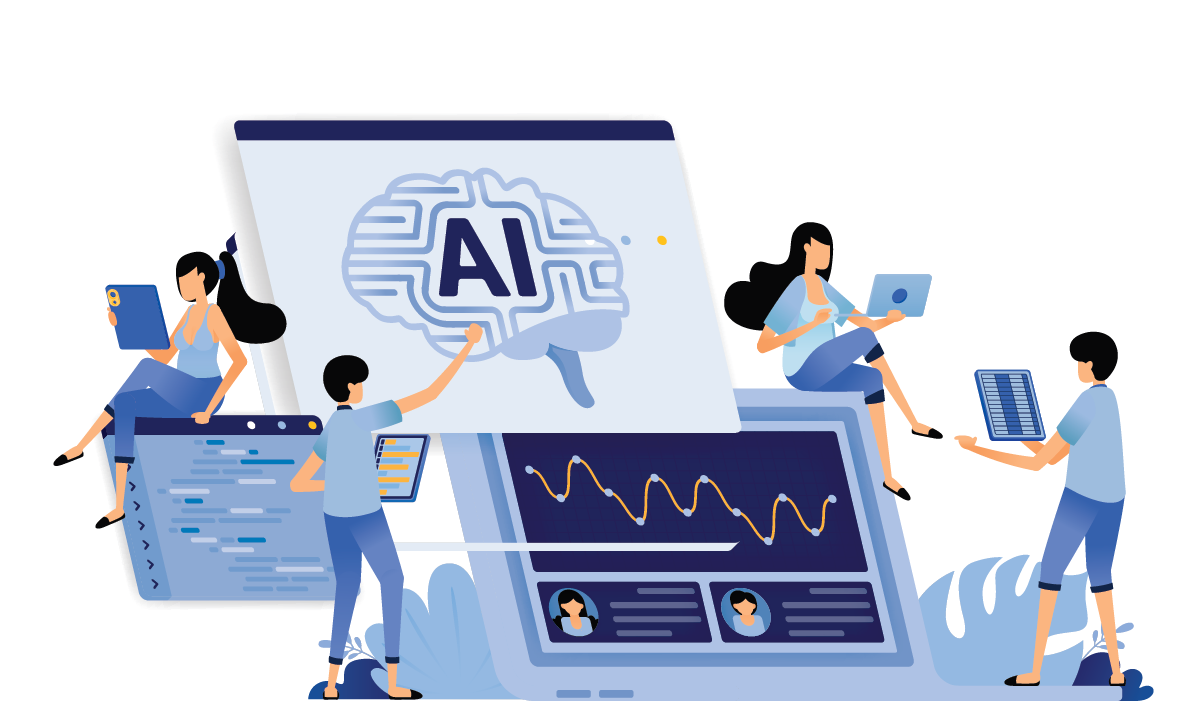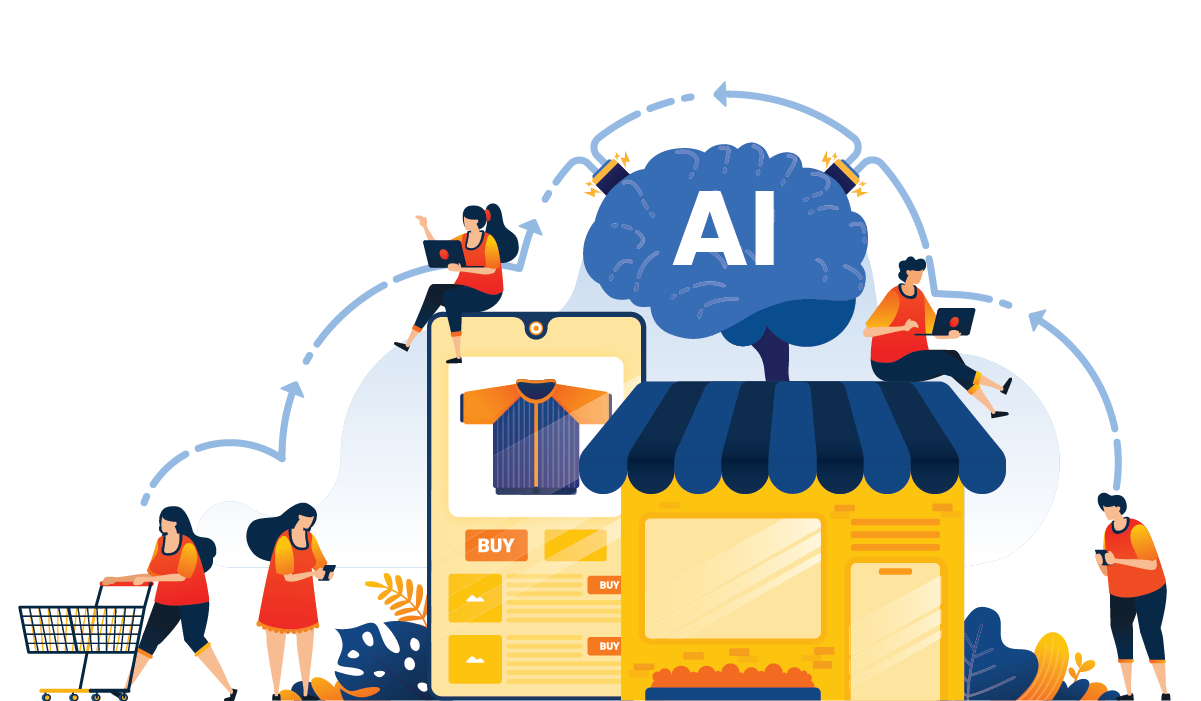AI strategies for business growth in the new year
2025 brings with it a unique set of business trends and challenges inherently tied to AI practices. 2024 saw leaps and bounds in AI technology, with the release of GPT-4o, increased public availability of advanced AI, and roughly 72% of companies reporting the adoption of AI for at least one business function. As we enter a new year, it’s time to prepare your business strategies to account for:
- New challenges in email marketing as email clients update their algorithms
- Harmful feedback loops with AI-generated copy
- Adjusted SEO strategies to account for AI search results
- Heightened competition brought on by AI-powered business tools
- AI coaching that drives competition among sales reps
- Prioritizing digital security with personalized marketing outreach
Prediction 1: Increased Threats to Your Email Health
With top email providers using AI for advanced inbox segmentation, the days of blasting out emails to your entire email list have come to a close. You have to step up your game when it comes to creating informative, engaging, and human-oriented email campaigns at scale. Successful email marketing in 2025 will require leveraging segmentation to get through filters set in place by email providers and achieve better open, click, and unsubscribe rates. You’ll also need to take advantage of AI to develop targeted content strategies for unique audiences, personalize content accordingly, and move quickly with new campaigns.
What to expect
Businesses determined to get ahead will take segmentation, personalization, and retargeting to a new level. In both B2B and B2C, you’ll see more brands disrupting longheld assumptions about email marketing “best practices,” experimenting with sending frequency, subject lines, and content. Businesses who do not develop a calculated strategy to account for inbox algorithms will risk destroying their open, unsubscribe, and spam rates.
How to respond
To benefit from new email marketing tools and approaches without damaging your domain health, it’s important to develop a careful balance between utilizing AI tools and maintaining original email content that prevents spam or unsubscribe risks. With top email clients including Gmail, Apple Mail, and Outlook expected to continue tweaking their sorting and labeling algorithms, monitoring your email domain and list health will remain a top priority in 2025. Check your domain health and validate email addresses on your mailing lists quarterly with tools like Emailable and Mailgun.
If you have sophisticated marketing needs, an email-specific marketing platform like Mail Chimp or Constant Contact is not going to have the capabilities you need to stay ahead of the game. Make sure your marketing automation platform offers advanced segmentation, personalization, and retargeting features to respond to these new challenges.
Prediction 2: AI Model Collapse Can Threaten Business’ SEO Status
Quality of AI-generated text is not a new concern, but there’s a snowball effect occurring that you need to prepare for. As more and more brands rely on AI to create copy for web pages, articles, and social posts, large language models (LLMs) have less human-generated content to learn and improve from. As a result, LLMs feed off of text created by their own or other AI models, creating a feedback loop of AI learning from AI. This can lead to a phenomenon called model collapse, in which models trained on AI outputs return low quality–or, in extreme cases, completely nonsensical–results.
While AI offers the benefit of saving time on detailed copywriting, model collapse threatens brands on multiple levels.
What to expect
Brands publishing 100% AI-generated text will face greater consequences in 2025. First, the quality of AI text will likely continue to go down if nothing changes. However, we can expect Google to continue to fine-tune its algorithms to penalize AI-generated text. This means that even if your marketing team is proofreading AI text before posting, your content can still be identified as AI-generated on Google and ranked accordingly. Websites full of AI content will see a decline in their SEO health, and even face blacklisting by Google. The same goes for social media accounts, with Meta and LinkedIn employing similar approaches.
How to respond
As always, you need to approach your content marketing strategy holistically and aim for high value content. Even if you’re flying under Google’s radar with AI content, your audience knows the difference. There’s no point in turning out content that offers no educational value and doesn’t speak to your viewers. If you’re a small business or working with limited bandwidth, block out time for one or two key members of your content team to create original articles, webpage copy, and social posts on a weekly basis.
If your content requires intensive research, you also need to consider where you are sourcing your information. AI can assist with gathering research, but you should always be able to trace that back to credible sources in your industry for relevant data, news, and insights. In order to truly establish your brand as a thought leader, you can take this up a notch by leveraging your own business experiences and social proof. By fueling your content campaigns from within, you’ll be better equipped to craft meaningful, high-performing stories and insights for your audience.
Prediction 3: Third-Party Sources Will Drive Your SEO
Google’s 2024 rollout of AI overviews at the top of search results made a permanent impact on how businesses need to approach SEO. As many businesses are still in the process of adjusting SEO strategies to respond to AI-powered search results, 2025 will be the year we see the true disparities between businesses who have adapted and those stuck in the past in regards to SEO.
The most important impact to consider involves the increasing importance of topical authority from third-party sources. Google’s AI overview feature draws its summaries from leading content on a given search topic, citing its sources meticulously. In recent years, Google has made efforts to prevent low-quality content from ranking high in search by penalizing activities like keyword packing. With AI overviews set to persist, high-quality, informative content will be more valuable than ever if you want Google’s algorithm to consider your website as a trusted source of information in your industry.
What to expect
AI-generated search results change what businesses need to prioritize with SEO. In 2025, you’ll start to see competitors building topical authority in places that are sources for AI search. This will involve not only developing content on their own websites, but securing more appearances in trusted sources in your industry in order to appear in local searches. Here’s an example of this strategy in action: if you’re a family law firm, search queries like “family law firms in my area” will return an AI summary naming top law firms with a presence on trusted third party sites such as online directories, your State’s association, or LinkedIn. Your business needs to have a presence on these sites in order to appear in the AI search results over your competitors.
Want to learn more about AI search and its implications on SEO? Read a detailed breakdown here.
How to respond
Adapt your SEO strategy to respond to AI search, and make time to keep learning and adjusting as needed on a regular basis.
Your website is still important and that won’t change. In order to appear as a source in Google’s AI overviews, you need information that the AI finds worthy of drawing info from. Continue to post high-quality articles and blogs, make your web pages clear and informative, and iterate on your website content regularly to optimize performance.
You also need to focus on gaining authority across the web by expanding your visibility on external sources. Use an SEO tool to monitor for backlinks, eliminating toxic backlinks and ensuring that your business has a strong presence on websites like LinkedIn and industry-specific directories or databases.
Prediction 4: AI Shakeout Will Redefine Tech Stacks
Not only has AI become more skilled, but AI tools are spanning further than they ever have before. You’re already seeing an increasing amount of generative and analytical AI within some of your business software, including:
- Messaging apps like Slack
- Project management tools like ClickUp
- CRMs like HubSpot
- ERPs offering upgrades for AI functionality
- Add-ons for CMS platforms like Wordpress and Shopify
While AI is spanning further than they ever have before, there’s not one unified way that top business platforms are approaching their AI packages. We’re in the wild west of the AI revolution, and we’re going to see some shakeout in 2025 as consumers determine which AI tools are worth paying for.
What to expect
In order to unlock the most fruitful AI tools on today’s business platforms, users face additional purchases beyond the up front cost of a software subscription. It’s doubtful, however, that customers paying for project management, CRM, and marketing tools will always be willing to pay additional costs to add AI to their plans. In 2025, the most successful companies will be the ones that provide AI capabilities to multiple platforms at once, making it easier for users to benefit from AI integrated across their tech stack–which will both bring costs down and drive more efficient workflows.
With more AI packages hitting the market, you should also expect your competitors to increase AI utilization in their marketing automation and prospecting campaigns to grow their reach and find new ways to appeal to your customers. With tools like AI data enrichment integrated directly into top CRM databases, you can expect competitors to enhance their own data insights using publicly available data in your industry.
How to respond
To stay competitive in 2025, you need an accessible CRM with the following AI features:
- Data enrichment
- Predictive lead scoring
- Instant reporting insights
- SEO analysis and recommendations
- Campaign optimization
Overall, this is the time to evaluate your tech stack and determine whether your current business tools have robust, cost-effective features to set you ahead of the competition. If any software you’re paying for has released new AI features that you haven’t explored yet, make sure to set aside some time to do that. If you’re facing infeasible add-on costs or limited AI features with the core apps in your tech stack, it might be time to explore new platforms.
Prediction 5: Cybersecurity, data privacy
2025 will underscore a growing paradox in consumer privacy preferences. Let’s make this clear: cybersecurity and data privacy should always be a top priority for businesses. But both B2B and B2C businesses face a growing demand in simultaneously providing highly personalized customer experiences and continuing to increase security measures. According to LinkedIn, 78% of customers in 2024 stated they feel more trusting towards companies that have clear privacy policies and data protection practices. At the same time, consumer data indicates that 71% of customers expect personalization, which makes them 76% more likely to make a purchase.
This poses the challenge of finding the best possible sales and marketing tools to fit the security and privacy needs of your internal team, your customer base, and your industry, while continuing to fine-tune your outreach efforts to each unique member of your audience.
What to expect
As of 2024, dozens of countries are subject to GDPR, 20 US states have comprehensive consumer data privacy laws, and it’s possible that number could grow in 2025. Today, we see many websites in the US trying to maneuver cookie regulations by creating confusing cookie opt-in messages that make it challenging for consumers to select their preferred cookie settings. In the coming year, websites with honest, simple, and straightforward opt-in settings will see the highest conversion rates, and those still using tricky tactics will face repercussions.
How to respond
Continue prioritizing the internal cybersecurity and at-large data privacy of your organization. When it comes to customer data, you need a CRM that doesn’t just data privacy standards, but makes maintaining security easy while seamlessly delivering an ideal customer experience.
Looking to improve data security on your CRM? Learn about HubSpot’s sensitive data settings here.
Core takeaways
As AI becomes further ingrained in business practices in 2025, it’s crucial for businesses in all industries to remain open and adaptable to new tools.
Here are the key points to remember:
- AI is everywhere, but strategy matters. From CRMs to sales coaching tools, AI capabilities are expanding rapidly. The businesses that succeed won’t just adopt AI—they’ll implement it strategically to complement their teams and processes.
- Quality over quantity still wins. Whether in content creation, email marketing, or SEO, producing high-quality, personalized, and authoritative materials remains essential. AI should enhance your efforts, not replace the human element of creativity and trust.
- Stay agile and informed. With AI tools constantly evolving, businesses must be prepared to pivot, test, and adapt. Regularly reassess your tools, strategies, and approaches to remain competitive.
- Integrity is non-negotiable. Consumers expect personalized experiences but demand original content and clear and trustworthy privacy practices. Use AI to enhance security while improving the customer experience.
Leveraging and responding to AI doesn’t mean cutting corners, but upping the game when it comes to quality and strategic business approaches.





